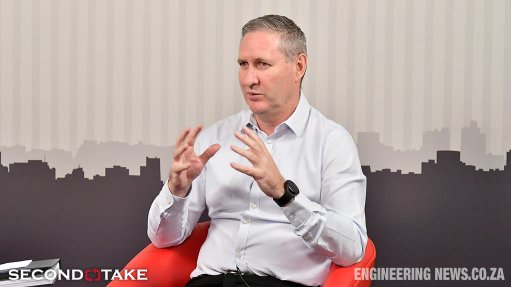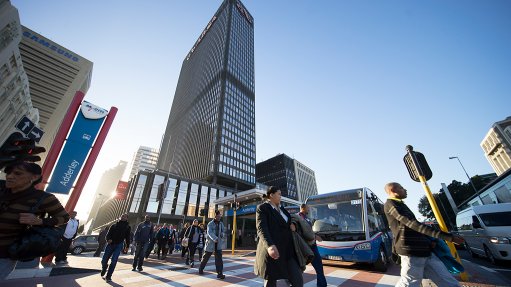The Impact of Industry 4.0 on Africa’s Manufacturing Sector
This article has been supplied as a media statement and is not written by Creamer Media. It may be available only for a limited time on this website.
Despite its status of a developing continent, Africa’s manufacturing space stands the opportunity to reap significant benefits from Industry 4.0, also known as “Fourth Industrial Revolution”. Industry 4.0 represents the complete digitisation of factories and manufacturing facilities that will ultimately merge with the unique needs of individual customers, resulting in benefits such as customised product design, manufacturing processes and final delivery to maximise customer satisfaction levels. Furthermore, Industry 4.0 brings with it a multitude of other benefits for industrialists such as cost, productivity, profitability and operations that manufacturers are striving to control, streamline, optimise or enhance. Similarly, these opportunities extend to small and medium businesses to establish new business models and assimilate into international value chains.
The Manufacturing Indaba 2019 intends to explore how governments should extend their investment beyond infrastructure and into the education and upskilling of Africa’s youth and existing workforces, so that they are empowered to utilise digital capabilities to the continent’s benefit. Routine task jobs previously performed by semi-skilled and unskilled workers are being replaced by the power and intellectual capacity of computers. This has consequently caused concern for the job-security of these workers, who must either acclimatise to these new jobs or be admitted to other positions or sectors. To reconcile this unease, it is critical that the governments and private sector jointly action steps with businesses and industries to revise the core training of employees by up-skilling and re-skilling the African workforce to keep abreast of these developments.
Furthermore, transformation of aspects relating to human resources of the continent’s manufacturing arena will transpire as analytics and algorithms lead the sequential functioning of machines, while employees monitor the ongoing performance thereof. The Fourth Industrial Revolution will also offer greater levels of safety to manufacturing facilities. People are limited to the duties they can perform in hazardous environments, whereas machines prove higher levels of competence in such situations, thereby reducing the number of workplace accidents. By promoting industrial safety, automated machinery enables producers to decrease medical claims of workers, reduces downtime, and saves on long-term capital expenses.
In addition, Industry 4.0 and IoT initiatives are set to empower rural and small business owners in Africa, whereby advanced data analytics available to them on their smart phones can promote greater collaboration among stakeholders along the entire value chain. Furthermore, access to connectivity and this form of enterprise software development, will support their daily operations through acceptance of digital payments and gaining insights into their customers so they can develop relevant marketing strategies in accordance with data collected. This essentially places them on a more level playing field to larger, more established businesses with the capital to access this data via costly in-house teams of software developers. In addition, it enables small business owners the opportunity to apply for bank loans, as they have irrefutable evidence (data) of their revenue and cash flow statistics.
These radical transformations in the African manufacturing space will be assimilated into the entire supply chain, thereby optimising processes and activities, and ultimately promoting efficiency and innovation for years to come. By successfully integrating Industry 4.0 and IoT into their systems, existing and prospective industry players can expect to reap even greater revenue and profit from their investment.
However, capitalising on these opportunities necessitates that policymakers take heed of the multitude of obstacles confronting the continent with regards to the revolution at hand. The ultimate concern is how African manufactures can capitalise on Industry 4.0 whilst simultaneously mitigating the accompanying risks. It stands to reason that the continent should embrace digitalisation by managing the associated challenges with relevant solutions provided by the technology available.
This year’s Manufacturing Indaba 2019 aims to acquaint Africa’s promising manufacturing sector to the revolutionary Industry 4.0 and its related principles. The event will enable attendees to get a taste of the exciting developments in this arena by connecting trade visitors with influential speakers who have expert knowledge on this subject matter. Participants within the sector will discover how to efficiently apply these ground-breaking techniques to their industrial facilities, allowing them the opportunity to increase profitability and place themselves in prime position to secure other competitive advantages made available through the implementation of these techniques.
Comments
Announcements
What's On
Subscribe to improve your user experience...
Option 1 (equivalent of R125 a month):
Receive a weekly copy of Creamer Media's Engineering News & Mining Weekly magazine
(print copy for those in South Africa and e-magazine for those outside of South Africa)
Receive daily email newsletters
Access to full search results
Access archive of magazine back copies
Access to Projects in Progress
Access to ONE Research Report of your choice in PDF format
Option 2 (equivalent of R375 a month):
All benefits from Option 1
PLUS
Access to Creamer Media's Research Channel Africa for ALL Research Reports, in PDF format, on various industrial and mining sectors
including Electricity; Water; Energy Transition; Hydrogen; Roads, Rail and Ports; Coal; Gold; Platinum; Battery Metals; etc.
Already a subscriber?
Forgotten your password?
Receive weekly copy of Creamer Media's Engineering News & Mining Weekly magazine (print copy for those in South Africa and e-magazine for those outside of South Africa)
➕
Recieve daily email newsletters
➕
Access to full search results
➕
Access archive of magazine back copies
➕
Access to Projects in Progress
➕
Access to ONE Research Report of your choice in PDF format
RESEARCH CHANNEL AFRICA
R4500 (equivalent of R375 a month)
SUBSCRIBEAll benefits from Option 1
➕
Access to Creamer Media's Research Channel Africa for ALL Research Reports on various industrial and mining sectors, in PDF format, including on:
Electricity
➕
Water
➕
Energy Transition
➕
Hydrogen
➕
Roads, Rail and Ports
➕
Coal
➕
Gold
➕
Platinum
➕
Battery Metals
➕
etc.
Receive all benefits from Option 1 or Option 2 delivered to numerous people at your company
➕
Multiple User names and Passwords for simultaneous log-ins
➕
Intranet integration access to all in your organisation

















